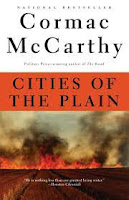I know the meaning of belles-lettres; but there are times I encounter stories which make me want to translate the phrase literally, “beautiful letters”. Cormac McCarthy’s All the Pretty Horses was one such story. Romantic in both sentiment and plot, it evoked strong images of the American west while telling the story of a young cowboy learning how warm the tongue yet sharp the teeth of the world can be. It was a pleasure to read. McCarthy’s authorial voice smooth and impeccable, he changed things up a little, however, in the follow up novel, The Crossing, by adding a little grit and worldly wisdom. Bringing these two novels together into a third is 1998’s Cities of the Plain. Does it evoke belles-lettres, add grit, or choose its own path?
John Grady Cole and Billy Parham were the main characters of All the Pretty Horses and The Crossing, respectively. In Cities of the Plain, readers discover their ultimate fates. At the outset, it’s post-WWII 1952 and the two young men work as cowboys on a small farm in New Mexico raising horses. Their industry dying, rumors loom of the government taking their ranch via eminent domain to build an army base. A pall of uncertainty exists over the pair’s lives. Getting by as they can, however, they live simply in their bunkhouse, occasionally going out for a glass of whiskey or horse rides. Things kick off when Cole falls in love with a Mexican prostitute at a brothel just across the border named Magdalena. Trying to fill a void in his life, Cole pursues Magdalena with the help of Parham. It’s a decision which has consequences for everyone involved.
To answer the question in the intro, Cities of the Plain seems to choose its own path. Readers who love McCarthy’s style need not worry greatly; his Hemingway-esque diction is still front and center, the short, direct sentences, the landscape depictions, the blunt realities, etc. But flow and consistency are a bit more dynamic. Alongside action and dialogue spelled out in the familiar, sharp minimalism, there are also moments McCarthy’s hides his cards. Intentionally being obscure, he gives the reader more responsibility. The novel requires an added degree of engagement for replete comprehension. With more happening below the surface, this is likely the most thought-provoking of the three Border novels.
All the Pretty Horses was beautifully written—truly belles-lettres. But its plot points were all tried and true. Presentation is more than half the battle in writing, and McCarthy nailed it. But the story, when boiled down, was pretty (no pun intended) standard. The Crossing, while perhaps not as “beautifully written” nevertheless felt non-standard and possessed scenes of substance beyond the main character’s immediate interests and emotions. In this context, I’m at odds over Cities of the Plain. John Grady’s plotline continues to be relatively standard: lonely cowboy tries to find love through a conflicted woman. I cannot describe further without spoiling except to say the climactic scene is cliché. But the ebb and flow of Cole’s story, the setting, and the role Parham plays in the narrative, combine to give the novel substance All the Pretty Horses does not have.
It may seem an odd comparison, but Cities of the Plain evokes a similar feeling as the conclusion of the Lord of the Rings. At the end of Tolkien’s novel, the elves and their magic exit the human world into the grey havens, their absence leaving a void. Cities of the Plain offers the same sentiment. Given the fates Cole and Parham suffer, the “magic” of cowboy life in America likewise fades into the “gray havens”. It leaves the reader with a sense of nostalgia, longing, and loss. Where the first two Border novels were exclusively the personal experiences of Cole and Parham, the story of Cities of the Plain, while still channeled through the two, nevertheless presents this additional layer of gravitas that makes it feel more than rote.
All the Pretty Horses won McCarthy the US’s most prestigious writing prize, the Pulitzer. Cities of the Plain, however, did not receive the same recognition. This is in no means a sign of quality, however. In fact, I would argue it’s Cities of the Plain which contains the thesis proper of All the Pretty Horses and The Crossing. For readers who don’t give a damn about theme, it at least provides closure to the tales of John Grady Cole and Billy Parham, all written in McCarthy’s impeccable hand, and in a story that may be familiar, but which unravels in satisfying fashion.


No comments:
Post a Comment